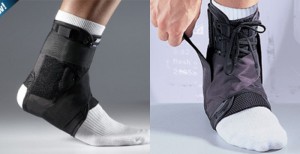Ankle Ligament Reconstruction
Operative Summary
Following ankle arthroscopy, the Anterior Talo-Fibula Ligament (ATFL) and/or Calcaneo-Fibula Ligament (CFL) are reconstructed by tightening the tissue by detaching, advancing and reattaching them with bone anchors or sutures.
Day of Operation (week 1)
Plaster back slab – mobilise touch weight bearing with 2 crutches
Home the same or next day depending on comfort / time of day
Strict elevation
Move toes, knee and hip
Weeks 1 – 2 Post Operatively
Strict elevation at the level of the chest, for 23 hours a day for 14 days (for pain relief and wound healing)
Plaster back slab – mobilise touch weight bearing with 2 crutches
Move toes, knee and hip. Straight leg raises
Week 3 Post Operatively (after 2 weeks completed)
Clinic review by Mr Gordon – removal of back slab, wound inspection, removal of sutures
Rigid walking boot fitted – full weight bearing (FWB)
At night – sleep in ankle brace
Start physiotherapy
If rigid walking boot HAS adjustable ankle hinge (Eg. DonJoy Maxtrax Walker)
Weeks 3-4: locked at 10 dorsiflexion and 20 plantar flexion, FWB
Weeks 5-6: locked at 20 dorsiflexion and 40 plantar flexion, FWB
Weeks 7 onward: Wean out of rigid walking boot, FWB
Boot can be removed for hygiene, but no weight through leg and no inversion or eversion
Physiotherapy: Active range of motion training in brace
If rigid walking boot does NOT have adjustable ankle hinge (Eg. Aircast FP Walker)
Weeks 3-6: rigid walking boot 24 hours/day, FWB
Boot can be removed for hygiene, but no weight through leg and no inversion or eversion
Physiotherapy
Weeks 3-4
Active range of motion out of boot – 10 dorsiflexion and 20 plantar flexion
Avoiding inversion/eversion
Weeks 5-6
Active range of motion out of boot – 20 dorsiflexion and 40 plantar flexion
Avoiding inversion/eversion
Weeks 7 onward:
Wean out of rigid walking boot, FWB
Week 7 – 11 : Stage 2
Goals:
Achieve full range of movement
Eversion strength grade 4 or 5
Restrictions:
No balance exercises until eversion grade 4 or 5
No impact exercise
Exercises:
Resisted inversion and eversion exercises with progression
Encourage isolation of evertors without overuse of other muscles
Core stability work
Exercises to teach patient to find and maintain sub-talar neutral
Balance / proprioception
Stretches of tight structures as appropriate (e.g. Achilles Tendon
Review lower limb biomechanics
Manual Therapy:
Scar massage with oil/aqueous cream
Soft tissue techniques as appropriate
Joint mobilisations as appropriate particularly sub-talar joint
Monitor sensation, swelling, colour, temperature
Hydrotherapy if appropriate
Pacing advice as appropriate
Milestones to progress to next phase:
Muscle strength: eversion grade 4 or 5 on Oxford scale
Full range of movement
Mobilising out of aircast boot
Neutral foot position when weight bearing / mobilising
Week 12 – 6 months : Stage 3
Exercises:
Range of movement
Progress strengthening of evertors
Core stability work
Balance / proprioception work i.e. use of wobble boards, trampet, gym ball, Dyna-cushion.
Stretches of tight structures as appropriate (e.g. Achilles Tendon), not of transfer.
Review lower limb biomechanics. Address issues as appropriate.
Sports specific rehabilitation
Week 12 – 6 months : Stage 3 continued
Manual Therapy:
Soft tissue techniques as appropriate
Joint mobilisations as appropriate ensuring awareness of those which may be fused and therefore not appropriate to mobilise
Monitor sensation, swelling, colour, temperature, etc
Orthotics if required via surgical team
Hydrotherapy if appropriate
Pacing advice as appropriate
Milestones to progress to next phase:
Independently mobile unaided
Muscle strength: eversion grade 5 on Oxford scale
Returned to low-impact activity/sports
6 months – 1 year : Stage 4
Goals:
Return to high impact sports
Normal evertor activity
Single leg stand 10 seconds, eyes open and closed
Multiple heel raise
Establish long term maintenance programme
Treatment:
Progression of mobility and function
Increasing dynamic control with specific training to functional goals
Gait re-education
Exercises:
Sports specific/functional exercises
Pacing advice
Milestones for discharge:
Independently mobile unaided
Good proprioceptive control on single leg stand on operated limb
Return to normal functional level
Return to sports if set as patient goal
Grade 5 eversion power
Summary
Week 7: Start proprioception and strength
Week 8: Start plyometrics
Week 12: Start straight running and functional activities (provided peroneal strength and proprioception normal)
Week 16: Cutting and sport-specific drills
Rigid Walking Boots Eg. DonJoy Maxtrax Walker (left), Aircast FP Walker (right)
Ankle braces with rigid side supports
Eg. Lace up: LP Elite by McDavid (pictured), Ankle Brace by Mueller; Velcro type: Aircast Airsport
Reference List
1. Karlsson J, Rudholm O, Bergsten T, Faxen E, Styf J Early range of motion training after ligament reconstruction of the ankle joint. Knee Surg Sports Traumatol Arthrosc 1995;3:173-7.
2. Karlsson J, Eriksson BI, Sward L Early functional treatment for acute ligament injuries of the ankle joint. Scand J Med Sci Sports 1996;6:341-5.
3. Karlsson J, Lundin O, Lind K, Styf J Early mobilization versus immobilization after ankle ligament stabilization. Scand J Med Sci Sports 1999;9:299-303.
4. Li X, Killie H, Guerrero P, Busconi BD Anatomical reconstruction for chronic lateral ankle instability in the high-demand athlete: functional outcomes after the modified Brostrom repair using suture anchors. Am J Sports Med 2009;37:488-94.
 Call for an Appointment
Call for an Appointment 







